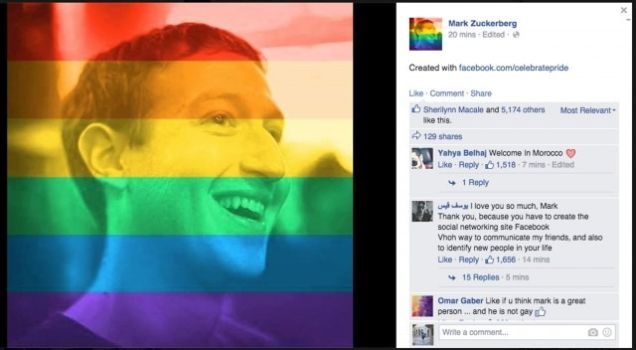Ricochet is the best place on the internet to discuss the issues of the day, either through commenting on posts or writing your own for our active and dynamic community in a fully moderated environment. In addition, the Ricochet Audio Network offers over 50 original podcasts with new episodes released every day.
 About Those Facebook Rainbow Profile Pics
About Those Facebook Rainbow Profile Pics

Gizmodo, June 29th, 2015
Marshall McLuhan famously stated “Control the media, control the message”. He also said “the more databanks record each one of us, the less we exist”. Very prescient.
Today was my first Facebook log-in since last weeks historic SCOTUS decisions. I wasn’t surprised to see the joyful posts and rainbow profiles. But this post isn’t about SCOTUS or the politics. It’s about how Facebook is using it and using us.
SSM was hardly the first issue to get so much play in social media, but it seems to have had the most impact. In fact, Facebook has been watching all of this very closely. Remember, Facebook is a public company under constant shareholder pressure to increase profit. Facebook has 1.44 billion products … er … I mean, Facebook has 1.44 billion active users.
Whatever your opinion is of the SCOTUS decision, Facebook feels that the historic social change provided ample opportunity to track users who placed those rainbow profiles on their page. Facebook is aggressively collecting this information and placing users who support SSM into a database, which I’m sure would never, ever be used for political purposes.
Before you feel smug satisfaction that you didn’t drape your profile in primary colors, you might wish to ask: What about those who didn’t don the rainbow? Into which database would they be placed? This overreaching Big-Brother archetype is beyond Orwellian, and it’s not the first time Facebook has done this:
… the last time there was a big profile picture protest for gay marriage, a Facebook data scientist quietly published an academic paper on the data that Facebook collected with the title “The Diffusion of Support in an Online Social Movement.” It’s not exactly beach reading, but it’s evidence that Facebook is paying close attention to how people use the social network to effect social and political change, as the Atlantic explains in more detail.
That last sentence is worth repeating. Facebook is no longer just seeing what you’re up to. Now it’s being used as a method “to effect social and political change.”
The SCOTUS decision certainly wasn’t the first massive social engineering experiment on Facebook. The so-called Arab Spring showed the world how Facebook and Twitter could be used as instruments of upheaval. The technological changes in the few years since the Arab Spring have been alarming.
We all know that by using a free social media site like Facebook, we’re willing to give up a little privacy in exchange for the perceived benefits of being connected with each other. However, the line between privacy and social engineering is becoming opaque. The impact of this on politics, policy, and the voters’ mindset shouldn’t be ignored.
Conservatives, who are generally older and less likely to rely on social media as their primary source of information, may be tempted to view Facebook as fluff. But remembering that there are 1.4 billion users — who can be manipulated and steered toward social or political change — should promptly sharpen their focus.
We should all be asking: Who are the architects of this social change, and what are their politics? One can’t help wondering what Marshall McLuhan would have to say.
Published in General



It’s rather sweet that so many people are displaying the millennia-old symbol of God’s covenant with man.
And the covenant, I hasten to add, was that He will never do to the earth what all the EnviroNazis think they can predict.
That seems to me to be more reinforcing for people what they already believe rather than persuading them to something new.
But I understand how it could push someone who is on the fence and expressing some interest over to the other side by making them think the world is over there.
And by the way, if Hollywood, California, and the Leftist Elites are so smart about marriage why are so many Hollywood couples always getting divorced.
Today I see that Ben Affleck and Jennifer Garner and divorcing. They aren’t even attempting to separate first. They have three kids, and they are divorcing, but this is supposed to be a reason to support homosexual marriage. (If the heterosexuals can’t make it work, why shouldn’t others be given a chance.)
If heterosexual marriage means less to Hollywood celebrities, they should obviously feel more ambivalence towards changing the definition. As Victor Davis Hanson has reported, California really doesn’t want more development and more new people. Perhaps people in California should think of changing the definition of marriage as being equivalent to something like this.